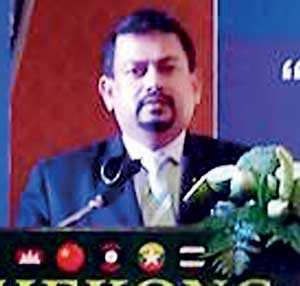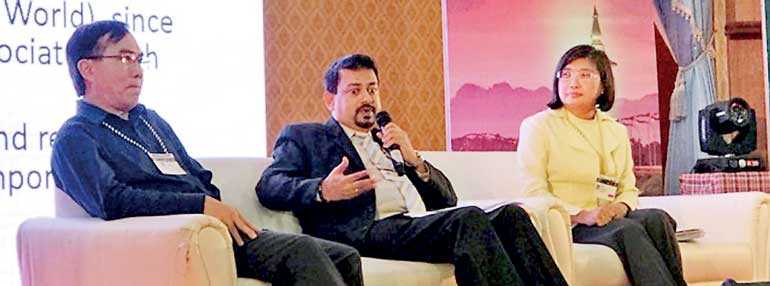Sunday Feb 22, 2026
Sunday Feb 22, 2026
Thursday, 19 July 2018 00:00 - - {{hitsCtrl.values.hits}}

Top tourism expert Malraj B. Kiriella was recently invited to speak at the Mekong Tourism Forum (MTF) 2018 in Nakhon Phanom, Thailand. The event attracted a record number of participants from world over this year comprising of ministers, governors, high-level officials from the Government and private sector, tourism professionals and media.
The Greater Mekong Sub-region (GMS) comprises six countries i.e. Cambodia, People’s Republic of China, Laos, Myanmar, Thailand, and Vietnam. GMS is a natural economic area bound together by the Mekong River, covering 2.6 million square kilometres and a combined population of around 326 million.
GMS Program helps the implementation of high priority sub-regional projects in transport, energy, telecommunications, environment, human resource development, tourism, trade, private sector investment, and agriculture.
GMS Tourism sector strategy is built on the principles of sustainable tourism development that is economically viable and contributes to sustainable development, gender equality, and poverty reduction in the region with a vision to promote the GMS as a single destination, offering a diversity of good quality and high-yielding sub-regional products.
MTF 2018 was hosted by the Ministry of Tourism of Sports of Thailand and Provincial Government of Nakhon Phanom in collaboration of Mekong Tourism Coordinating Office. This year’s theme was ‘Transforming Travel – Transforming Lives’ considering the fact that travellers today are seeking a more transformative and soul-enriching experience. The conference stressed that tourism can be an important catalyst in changing people’s lives for the better through mutual understanding and acting more responsibly.
Kiriella spoke at the seminar on Buddhist tourism which explored the power of transformative travel. The seminar highlighted Buddhist tourism as one of the fastest growing tourism segments in Asia, which not only draws international tourists into the GMS, but also boots domestic travel and contributes significantly to the local economies.

Nakhon Phanom, this year’s host city of MTF is an important centre of Buddhism in north eastern Thailand and considered as a perfect destination to focus on Buddhist tourism. Kiriella emphasised on the importance of tapping the untapped potential in Buddhist tourism specifically in the South Asian region which lays claim to many monasteries and temples with historical value with several learned monks and Buddhist population. He stressed that the product need to be more developed with required infrastructure facilities such as accommodation, sanitary facilities, information and storytelling and to make more experiential products such as festivals and promoting core Buddhist principles i.e. dana, seela and bhavana (offerings, good conduct and meditation) to lure tourists to the region.
The MTF 2018 tried to raise awareness of the issue and make the event plastic free. It has designed a limited-edition refillable water bottle, as part of the MTF 2018 plastic free kit. Eight thematic strategy workshops on topics such as food tourism, adventure tourism, wellness tourism, and more, were conducted in eight ethnic community villages around Nakhon Phanom by visiting and engaging with the local communities. In this context, the delegates experimented with a new conference theme of hosting the actual sessions together with the local communities in their ethnic villages, and have the local people participate and be part of the experience.

Multidisciplinary professional, Malraj B. Kiriella who has gained experience by working in both public and private sectors in travel and tourism currently functions as the Founder and Owner of South Asian Multidisciplinary Advisory Services ( SAMAS) which has a mission to facilitate all stakeholders through an ethical and competent service whilst contributing towards sustainable development in the South Asian region with a special focus on SME empowerment through Corporate Social Responsibility initiatives.
This facilitation is conducted by drawing appropriately from multiple academic and professional disciplines to redefine problems outside normal boundaries and provide one stop solutions based on a new understanding of complex situations.